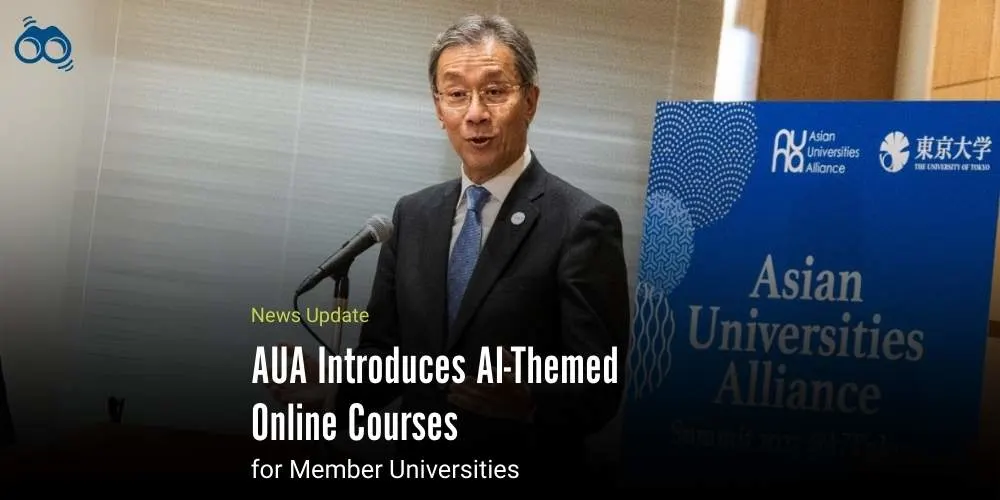AI in Higher Education: AUA and Tsinghua University Partner to Deliver Online Courses
Asian Universities Alliance Expands Access to AI Education Through Online Learning
In a landmark effort to advance technology-driven education across Asia, the Asian Universities Alliance (AUA) has announced the launch of six new online courses focused on artificial intelligence (AI), developed by the globally renowned Tsinghua University. Founded in 1911 and based in Beijing, Tsinghua is widely regarded as one of China’s most prestigious institutions.
Consistently ranked among the world’s top universities, it leads in disciplines such as computer science, engineering, and AI, and is recognised for its cutting-edge research and international engagement. Its involvement in this initiative reflects a longstanding commitment to shaping the future of online learning and empowering AI students through open, high-quality educational resources. This announcement follows the inaugural session of the AUA Presidents Forum, held at the University of Tokyo in April 2025, under the theme “Promise and Risk of Artificial Intelligence in Higher Education.” During the forum, university leaders and academic experts reportedly expressed a shared commitment to expanding the role of AI in higher education, promoting educational equity, and strengthening global collaboration in education through the AUA platform.
The newly launched AI-themed courses for universities are now available via the XuetangX online education platform, offering open learning opportunities to students across all AUA member institutions. These artificial intelligence online courses are designed to deliver high-quality content and practical insights into emerging AI programmes, and are accessible free of charge. According to the AUA Secretariat, the initiative supports the internationalisation of universities and aims to equip artificial intelligence students with the skills required to thrive in a rapidly evolving digital landscape.
Each course explores a distinct area within the artificial intelligence curriculum, ranging from ethical governance to industrial innovation. The full list includes:
Higher Education at the Crossroads: Pioneering AI-Driven Paradigm Shifts
Artificial Intelligence Empowers Higher Education: Exploring Innovative Practice
AI Medical and Health Applications: Inclusive Design and Innovation
AI and Industrial Innovation
AI and Ethical Governance
AI and Sustainable Convergence
These programmes for AI are tailored to support both undergraduate and postgraduate learners, offering flexible online study options that align with the evolving demands of online education. Hosted on XuetangX, a leading platform in online learning, the courses are accompanied by a detailed guide to help students navigate registration, course access, and assessment.
To begin, students are encouraged to visit XuetangX using a recommended browser such as Google Chrome. After registering or logging in, they can search for the relevant online artificial intelligence courses and click “Join Course” to enrol. Once enrolled, students can access their dashboard under “My Courses,” where content is organised into four key sections:
Learning: Includes video lectures and interactive exercises
Discussions: Enables peer engagement and instructor feedback
Grades: Displays assessment breakdowns and performance tracking
Announcements: Shares updates from course instructors and assistants
This initiative not only enhances student access to online study but also reinforces the role of the artificial intelligence university in shaping inclusive, future-oriented education systems. By offering free, high-quality AI skills for students, the AUA and Tsinghua University are helping to redefine the boundaries of online education and support the next generation of leaders in science, technology, and policy. As universities embrace the future of learning, these AI courses exemplify how open, collaborative, and digitally enabled education can foster meaningful global impact.
Editor’s Note:
Artificial Intelligence (AI) is no longer a niche subject reserved for computer science departments; it is rapidly becoming a core component of university curricula across disciplines. From medicine and engineering to ethics and education, AI is reshaping how students learn, think, and prepare for the future. According to UNESCO, over 60% of universities worldwide now offer AI-related modules, and demand for AI skills has surged by more than 200% in graduate job markets over the past five years. The Asian Universities Alliance (AUA), in collaboration with Tsinghua University, has taken a forward-thinking step by launching six free online courses on the XuetangX platform. These courses are designed not only to introduce students to the fundamentals of AI, but also to explore its real-world applications and societal impact. What makes this initiative particularly valuable is its accessibility; students from all AUA member universities can enrol and study at no cost, making it a model for inclusive, technology-driven education.
The courses provide diverse perspectives on the evolving AI landscape. Higher Education at the Crossroads explores how AI is reshaping teaching and learning, while Artificial Intelligence Empowers Higher Education highlights its role in advancing research and pedagogy. AI Medical and Health Applications introduces its impact on diagnostics, patient care, and inclusive design, and AI and Industrial Innovation examines how it drives efficiency and creativity across industries. Addressing the ethical dimension, AI and Ethical Governance prepares students to navigate issues of fairness, privacy, and accountability. Finally, AI and Sustainable Convergence connect AI to global sustainability goals, showing how intelligent systems can support climate action and resource management.
Skoobuzz underlines that together, these courses provide students with a well-rounded understanding of AI, not just as a technical skill, but as a tool for solving complex problems and contributing to society. Learners will gain insights into data analysis, machine learning, ethical reasoning, and interdisciplinary collaboration, all through flexible online study.














0 Comments (Please Login To Continue)